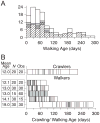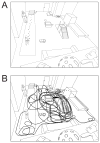How do you learn to walk? Thousands of steps and dozens of falls per day
- PMID: 23085640
- PMCID: PMC3591461
- DOI: 10.1177/0956797612446346
How do you learn to walk? Thousands of steps and dozens of falls per day
Abstract
A century of research on the development of walking has examined periodic gait over a straight, uniform path. The current study provides the first corpus of natural infant locomotion derived from spontaneous activity during free play. Locomotor experience was immense: Twelve- to 19-month-olds averaged 2,368 steps and 17 falls per hour. Novice walkers traveled farther faster than expert crawlers, but had comparable fall rates, which suggests that increased efficiency without increased cost motivates expert crawlers to transition to walking. After walking onset, natural locomotion improved dramatically: Infants took more steps, traveled farther distances, and fell less. Walking was distributed in short bouts with variable paths--frequently too short or irregular to qualify as periodic gait. Nonetheless, measures of periodic gait and of natural locomotion were correlated, which indicates that better walkers spontaneously walk more and fall less. Immense amounts of time-distributed, variable practice constitute the natural practice regimen for learning to walk.
Figures



References
-
- Adolph KE. Learning in the development of infant locomotion. Monographs of the Society for Research in Child Development. 1997;62(3) Serial No. 251. - PubMed
-
- Adolph KE. Learning to keep balance. In: Kail R, editor. Advances in child development and behavior. Vol. 30. Amsterdam: Elsevier Science; 2002. pp. 1–40. - PubMed
-
- Adolph KE. The growing body in action: What infant locomotion tells us about perceptually guided action. In: Klatzy R, Behrmann M, MacWhinney B, editors. Embodiment, ego-space, and action. Mahwah: Erlbaum; 2008. pp. 275–321.
-
- Adolph KE, Robinson SR. The road to walking: What learning to walk tells us about development. In: Zelazo P, editor. Oxford handbook of developmental psychology. NY: Oxford University Press; (in press)
Publication types
MeSH terms
Grants and funding
LinkOut - more resources
Full Text Sources
Other Literature Sources
Medical

